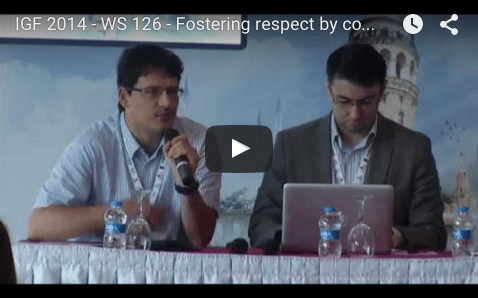Posted at 17:46h
in
Events,
News
by Allon Bar
RDR had an active presence at this year’s Internet Governance Forum, an annual multi-stakeholder meeting organized by the United Nations which brings together representatives from governments, companies, civil society, and the technical community to discuss key issues of common concern related to the internet’s future. This year’s ninth annual forum was held in Istanbul and attended by over 3,000 people from around the world, with one of the sub-themes being ‘the Internet and human rights’. Our team presented Ranking Digital Rights during several gatherings and received positive responses.
RDR public workshop and stakeholder meeting
The IGF offered various sessions on privacy impacts in the post-Snowden era, and brought significant attention to human rights-related issues. We organized a workshop with the Rio Institute for Technology and Society (ITS) on how companies can be encouraged to respect the human rights of their users. The workshop featured representatives from civil society (Human Rights Watch, ITS, and Allon Bar on behalf of Ranking Digital Rights), private sector (Facebook, Tunisian Internet Agency, Blunai), government (UK) and multi-stakeholder groups (Global Network Initiative). Charles Mok, a Hong Kong legislator who has pushed for transparency on government requests for user data, moderated the panel. Click here to read a summary of the session, or you can watch it on YouTube here:

During the session, several panelists (other than ourselves!) highlighted the potential Ranking Digital Rights has as a way to improve companies’ respect for human rights. Human Rights Watch’s Cynthia Wong explained how standard setting and measurement are important approaches to improve corporate behavior. Ihab Osman of Blunai also mentioned RDR as a way to influence companies’ policies while further focusing on the importance of stimulating good behavior on the part of individual business leaders. Other workshop participants focused on the critical role governments play in how companies handle human rights.
We also organized a meeting with half a dozen companies as well as with project researchers and advisors present at the IGF. We discussed the status of the project, our plans for the ranking pilot later this year, and the full ranking taking place in 2015. It was a useful way to get feedback, for example, about how to assess companies operating in multiple countries and also to answer questions about how we plan to approach the ranking.
UNESCO report on Internet intermediaries and freedom of expression
Another key gathering for us at the IGF was UNESCO’s workshop on “Intermediaries’ role and good practice in protecting freedom of expression”. Rebecca MacKinnon, one of the lead authors of a forthcoming report on the topic presented the research results. The report will be published later in the Fall and explores how different intermediary types (Internet service providers, search engines, and social networks) can adopt policies and practices to protect their users’ right to freedom of expression. Ranking Digital Rights staff and research partners were heavily involved in drafting the report. You can watch the video of the entire session here:

Dynamic Coalition on “Platform Responsibility”
New to the scene at the IGF was the Dynamic Coalition on Platform Responsibility, which held its formational meeting in Istanbul. This new coalition aims to promote initiatives that focus on companies’ responsibility to promote human rights. Rebecca MacKinnon offered the opening address to its inaugural gathering, posing the question how companies can be encouraged to minimize human rights harms, while maximizing privacy and freedom of expression. Follow up plans include a project to draft concrete recommendations for what companies’ policies should look like.
Freedom Online Coalition Working Group on Privacy and Transparency
RDR’s Rebecca MacKinnon is a member of a new multi-stakeholder working group on privacy and transparency created by the Freedom Online Coalition which describes itself as a “partnership of 23 governments working to advance Internet freedom”. The working group’s inaugural meeting was held at the IGF. Through this working group as well as through active involvement with other organizations and activities, RDR intends to be part of an effort to develop and advance transparency and accountability by governments as well as companies when it comes to policies and practices that affect Internet users’ fundamental freedoms.
Other initiatives
The IGF also proved a great venue to learn more about other region or issue-specific efforts to rank technology companies. These include the Thai Netizen Network’s effort [in Thai] to assess security practices of Internet companies operating in Thailand, and a scoring by the Association of Progressive Communications of APC’s scoring of efforts by social media companies to prevent violence against women.
In all, it was a busy and productive week for us at RDR. It highlighted our work to a wider audience and further galvanized us on this mission.



